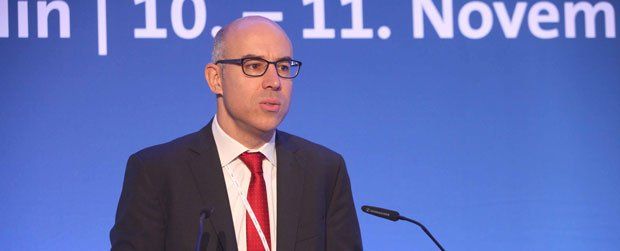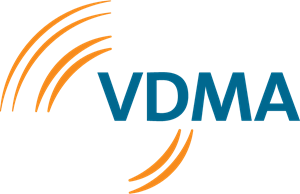Open markets
Working group 1

Open markets
The first working group of the VDMA General Assembly 2016 will deal with the question of how politics and mechanical engineering can jointly create framework conditions for free trade. The German mechanical and plant engineering industry in particular is dependent on open markets, as more than 75 percent of its machinery and components are exported abroad.
Professor Felbermayr from the ifo Institute in Munich sees not only declining world trade but also increasing protectionism as a mega trend. He also predicts that most of the future growth will take place outside Germany. This poses challenges for entrepreneurs. Rainer Hundsdörfer, Chairman of the VDMA Foreign Trade Committee, appeals to the participants in the working group: "We, the entrepreneurs, must do much more than before to promote the importance of free trade". Reducing dependence on markets and actively promoting technological innovations are some of the strategies that Hundsdörfer sees as the solution.
"We, the entrepreneurs, must do much more than before to advertise the importance of free trade".
Rainer Hundsdörfer, Chairman VDMA Foreign Trade Committee
The subsequent panel discussion will examine the question of how European policy can ensure free trade. Ms Signe Ratso from the European Commission and the two MEPs Bernd Lange and Daniel Caspary will discuss with representatives of companies how trade barriers and market access restrictions can be dismantled in the long term. After all, it is not only European policymakers who should make their contribution to free trade, but also companies. They too can benefit from the conclusion of further free trade agreements.
Open markets
The EU states have decided to extend the Russian sanctions. Possible easing of the sanctions is therefore possible from the end of January 2017 at the earliest. The VDMA views this decision critically.
The EU states have decided to extend the Russian sanctions. Possible easing of the sanctions is therefore possible from the end of January 2017 at the earliest. The VDMA views this decision critically.
There is increasing criticism from various EU member states that the lifting of the sanctions is linked to the full implementation of the Minsk Agreement. This is because Russia is not solely responsible for the implementation of this agreement. The VDMA calls on politicians to make improvements here and to look for alternative solutions. "Minsk 2 must not become a dead end. The longer the sanctions are maintained, the greater the danger of a permanent drifting apart of Russia and Europe", warns Thilo Brodtmann, General Manager of the VDMA.
The Russian economy is still suffering from a mixture of low oil prices, rouble crisis and sanctions. Russia's trade with the world shrank by around 35 per cent last year; a trend that is continuing this year. This also affects countries that have not imposed sanctions on Russia. "But when the Russian economy picks up again at the latest, European suppliers will be permanently left behind," says Brodtmann.
However, German exports of machinery and equipment to Russia appear to have bottomed out. "In the first four months of 2016, exports to Russia fell by another 4.7 percent. This means that the rapid downward trend of the last two years for the industry as a whole appears to have come to a halt for the time being," predicts Ulrich Ackermann, Head of Foreign Trade at the VDMA. "For 2016, the VDMA is expecting a single-digit decline. The forecast could turn out somewhat more positive if the oil price were to settle permanently at 50 to 60 dollars per barrel and the rouble exchange rate remains stable. But we are still a long way from a revival of business. Russia is currently ranked eleventh among the top export markets of the German mechanical engineering industry; before the beginning of the crisis it was still ranked fourth.
However, the balance from January to April 2016 differs greatly in the various branches of the mechanical engineering industry. A clear improvement is visible in the sectors that are profiting from the Russian food embargo, especially agricultural machinery (+87 percent), food and packaging machinery (+5 percent) and drive technology (+10 percent). The free fall in construction and building materials machinery appears to have stopped, with growth of 57 percent. Exports of mining machinery rose by 39 percent and gas turbines by 51 percent. By contrast, the books continue to show significant losses in machine tools (-39 percent), plastics and rubber machinery (-36 percent), and general ventilation and materials handling technology (both -17 percent).
While Europe is discussing sanctions, Russia is trying to become less dependent on imports and oil with large-scale industrial development programmes. To achieve this, the country is dependent on know-how from abroad. For this reason, Russian Industry Minister Denis Manturov and Economics Minister Aleksei Ulukajew have visited Germany several times in recent months and promoted Russia as a business location. And rarely has the rush of European companies and politicians at the St. Petersburg Economic Forum been as great as in June this year.
Open markets
In Working Group 1 of the VDMA General Assembly on 10 and 11 November 2016 in Berlin, everything will revolve around the question of how mechanical engineering and politics can secure free trade.
Various studies, for example by the ifo Institute, show that free trade agreements mean considerable economic advantages for the member countries. Free access to the world market is a key to competitiveness, especially for Germany's medium-sized mechanical and plant engineering companies. Businesses and politics should be equally committed to ensuring that free trade is possible worldwide. Politics is called upon to create the appropriate framework conditions for a free exchange of goods. As an export-strong nation, Germany must therefore work for far-reaching liberalization at all levels.
Strategy of the EU Commission
At the General Assembly 2016, Working Group I "Securing free trade - what can politics and engineering do? Decision makers from politics and economy. A representative of the European Union responsible for trade policy will present the new trade policy strategy of the EU Commission. In addition, company representatives will discuss with representatives of European politics how free trade can be secured in the future. Audience surveys are intended to provide an up-to-date picture of the mood of the participants.
Focus on bilateral agreements
The European Union intends to further extend its network of bilateral agreements with key partner countries. Talks with Mercosur, the common market of South America, and India are to be resumed in the second half of the year. In addition, initiatives with New Zealand and other countries are to be launched shortly.
However, the discussions on the Comprehensive Economic and Trade Agreement (CETA) with Canada and the Transatlantic Trade and Investment Partnership (TTIP) have shown that policymakers are called upon to point out the consequences of free trade in detail and to communicate them in an open dialogue.
Strategy adjustment necessary
Prof. Dr. Gabriel Felbermayr from the ifo Institute in Munich will point out significant challenges for the capital goods industry in Germany on the basis of the future development in global trade. Companies will be required to adapt their strategies to the permanently changing market environment in order to remain successful in the long term.




